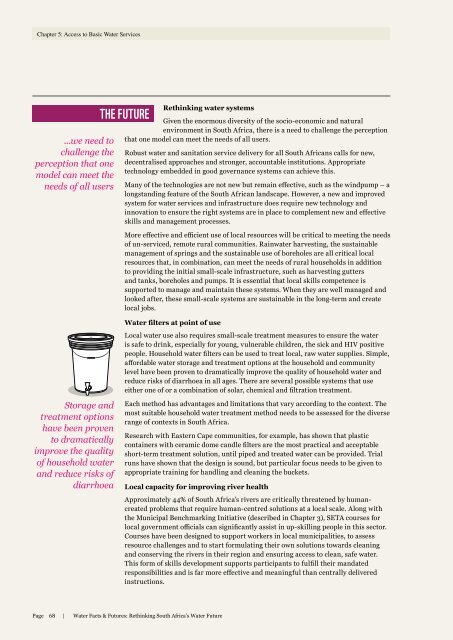55UXOuRjI
55UXOuRjI
55UXOuRjI
Create successful ePaper yourself
Turn your PDF publications into a flip-book with our unique Google optimized e-Paper software.
Chapter 5: Access to Basic Water Services<br />
...we need to<br />
challenge the<br />
perception that one<br />
model can meet the<br />
needs of all users<br />
THE FUTURE<br />
Rethinking water systems<br />
Given the enormous diversity of the socio-economic and natural<br />
environment in South Africa, there is a need to challenge the perception<br />
that one model can meet the needs of all users.<br />
Robust water and sanitation service delivery for all South Africans calls for new,<br />
decentralised approaches and stronger, accountable institutions. Appropriate<br />
technology embedded in good governance systems can achieve this.<br />
Many of the technologies are not new but remain effective, such as the windpump – a<br />
longstanding feature of the South African landscape. However, a new and improved<br />
system for water services and infrastructure does require new technology and<br />
innovation to ensure the right systems are in place to complement new and effective<br />
skills and management processes.<br />
More effective and efficient use of local resources will be critical to meeting the needs<br />
of un-serviced, remote rural communities. Rainwater harvesting, the sustainable<br />
management of springs and the sustainable use of boreholes are all critical local<br />
resources that, in combination, can meet the needs of rural households in addition<br />
to providing the initial small-scale infrastructure, such as harvesting gutters<br />
and tanks, boreholes and pumps. It is essential that local skills competence is<br />
supported to manage and maintain these systems. When they are well managed and<br />
looked after, these small-scale systems are sustainable in the long-term and create<br />
local jobs.<br />
Water filters at point of use<br />
Local water use also requires small-scale treatment measures to ensure the water<br />
is safe to drink, especially for young, vulnerable children, the sick and HIV positive<br />
people. Household water filters can be used to treat local, raw water supplies. Simple,<br />
affordable water storage and treatment options at the household and community<br />
level have been proven to dramatically improve the quality of household water and<br />
reduce risks of diarrhoea in all ages. There are several possible systems that use<br />
either one of or a combination of solar, chemical and filtration treatment.<br />
Storage and<br />
treatment options<br />
have been proven<br />
to dramatically<br />
improve the quality<br />
of household water<br />
and reduce risks of<br />
diarrhoea<br />
Each method has advantages and limitations that vary according to the context. The<br />
most suitable household water treatment method needs to be assessed for the diverse<br />
range of contexts in South Africa.<br />
Research with Eastern Cape communities, for example, has shown that plastic<br />
containers with ceramic dome candle filters are the most practical and acceptable<br />
short-term treatment solution, until piped and treated water can be provided. Trial<br />
runs have shown that the design is sound, but particular focus needs to be given to<br />
appropriate training for handling and cleaning the buckets.<br />
Local capacity for improving river health<br />
Approximately 44% of South Africa’s rivers are critically threatened by humancreated<br />
problems that require human-centred solutions at a local scale. Along with<br />
the Municipal Benchmarking Initiative (described in Chapter 3), SETA courses for<br />
local government officials can significantly assist in up-skilling people in this sector.<br />
Courses have been designed to support workers in local municipalities, to assess<br />
resource challenges and to start formulating their own solutions towards cleaning<br />
and conserving the rivers in their region and ensuring access to clean, safe water.<br />
This form of skills development supports participants to fulfill their mandated<br />
responsibilities and is far more effective and meaningful than centrally delivered<br />
instructions.<br />
Page<br />
68 | Water Facts & Futures: Rethinking South Africa’s Water Future


